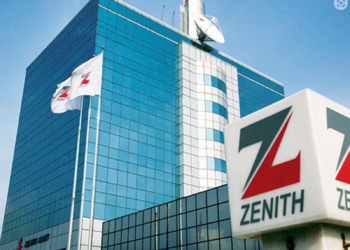Zenith Bank Plc has released its unaudited financial results for the first quarter ended March 31, 2025, reporting an all-time high quarterly interest income of N837.64 billion.
This represents a 71.46% year-on-year growth compared to Q1 2024.
The robust interest income contributed to a strong bottom-line performance, with pre-tax profit rising by 9.56% to N350.82 billion.
Post-tax profit also surged by 20.7% year-on-year to N311.83 billion, accounting for over 30% of the bank’s total profit for the full year 2024.
Key highlights Q1 2025 vs. Q1 2024:
Gross earnings: N949.857 billion +21.68% YoY
Interest Income: N837.643 billion +71.46% YoY
Interest Expense; N246.453 billion +35.34% YoY
Net interest income; N591.190 billion +92.92% YoY
Net fee and commission income: N56.039 billion -2.90% YoY.
Earnings per share N7.59 -7.66% YoY
Loans and advances to customers N10.051 trillion +16.19%.
Cash and Cash equivalents N9.542 trillion +16.89%
Total Assets N32.415 trillion +33.50%.
Customers’ deposits N22.682 trillion +35.14%.
Results Insight
Zenith Bank posted an impressive performance in Q1 2025, powered largely by strong earnings from its core lending and investment activities known collectively as interest income.
This segment remains the main engine of growth for the bank.
The bank’s interest income, which is the money earned from giving out loans and investing in financial instruments, rose significantly, with key contributions from the following sources:
- Loans and advances to customers and other financial institutions generated N460.97 billion in interest income, up 53.4% year-on-year.
This segment contributed 55% of total interest income, though slightly lower than its 66% share in Q1 2024.
The dip in contribution is understandable given the bank’s increased investments in other interest-bearing assets and nonetheless reflects a solid expansion in its loan book, which grew by over N1.4 trillion in just three months.
- Investments in securities, particularly treasury bills, contributed significantly, with income rising 113.24% to N328.8 billion.
This boosted its share of total interest income to 39.23%, up from 30% a year ago.
Zenith invested an additional N2.68 trillion in treasury bills in Q1 2025 alone, capitalizing on attractive yields in the high-interest rate environment.
- Income from cash balances (such as placements with other banks) also rose by 41% to N47.87 billion, contributing 5.71% of total interest income.
However, while Zenith made more money from lending and investments, it also spent to attract and retain deposits.
Interest expenses surged to N246.45 billion, with over 70% coming from interest paid on customer deposits. This increase aligns with the significant growth in Zenith’s deposit base.
The bank mobilized an additional N5.9 trillion in Q1 2025. It also raised N1.06 trillion in additional borrowings.
Together with the elevated interest rate environment, these factors contributed to the higher funding costs.
Despite this, Zenith retained a healthy portion of its earnings after interest costs.
The bank recorded N591.19 billion in net interest income, a 92.92% increase from Q1 2024, representing over 70% of its gross interest earnings, up by 12.52% from the previous year.
What is more surprising is that despite the rapid loan growth, the bank reduced its provisions for bad loans.
Impairment charges dropped by 27.81% to N35.95 billion, suggesting improved asset quality or more prudent lending practices.
This boosted net interest income after impairment loss to N541.81 billion, an impressive 116.31% year-on-year growth.
Non-interest income
Zenith’s non-interest income showed modest growth. It rose slightly by 0.98% to N78.98 billion, driven by:
- Account maintenance charges, which rose by 18.74% to N20.06 billion.
- Electronic banking income, although down by 19%, still contributed N16.17 billion.
Balance sheet highlights
Zenith’s total assets rose by N8.13 trillion in Q1 2025, largely driven by the growth in its deposit base, which expanded by N5.9 trillion.
A notable increase was also recorded in restricted deposits with the CBN, which rose by N2.24 trillion, reflecting the regulatory cash reserve requirements.





















